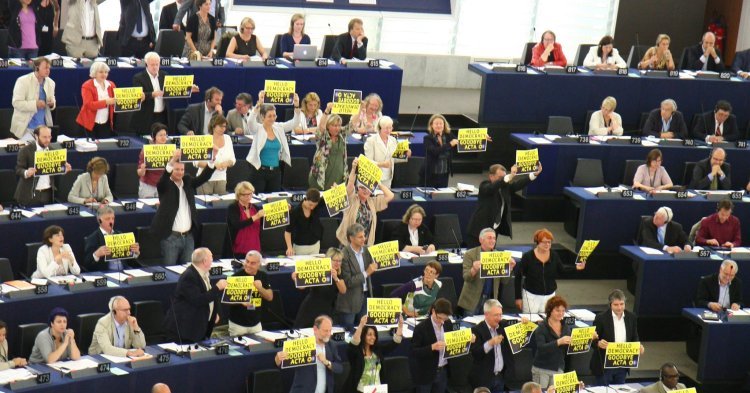The Greens, together with the European Free Alliance (EFA) with whom they have long formed a bloc, currently hold 68 seats in the European Parliament. That’s just under a tenth of the total, up from 6.9% in the last legislative period, although they lost 11 British MEPs and the reallocation of only 4 seats to the bloc was a disproportionate loss.
Still a force to be reckoned with within the European Union’s co-legislating and only directly elected organ, the Green/EFA alliance is a possible kingmaker in getting legislation across the line, particularly in light of the loss of majority votes that the Social Democrats (S&D) and centre-right European People’s Party (EPP) suffered in the 2019 European elections. However, the Greens have limited appeal beyond the Western European countries in which the so-called “Green Wave” originated.
With the corona crisis distracting us from the bigger crisis already beginning to bite, the Greens want socially and financially viable changes to our economic model to tackle both.
On Friday 12th June, The New Federalist attended the virtual press conference as part of the European Green Party’s Council, which, despite the inevitable technical hitch or two, made the event accessible for publications such as ours which do not have a physical base in Brussels. Co-chairs of the European Green Party Evelyne Huytebroeck and Thomas Waitz spoke about what greener policy-making can offer society, even in and especially in times of corona, and took questions from journalists.
Corona vs climate: don’t forget the other crisis
Huytebroeck and Waitz both emphasised the necessity of avoiding the perception that we must first deal with the most pressing first before turning our attention to the next one: both must be fought in tandem.
“What we are seeing now is a collective crisis experience. This is raising awareness of the biggest crisis to come which we are already experiencing,” affirmed Waitz. “We have seen how a change of behaviour is possible, how we can adapt. However, the huge efforts made to release significant resources to secure people’s daily incomes cannot be repeated within the next few years, our resources would run dry. We must tackle the climate crisis at the same time – by fostering an ecological transition of business, industry and consumption.”
The New Federalist enquired as to what extent the European Greens were satisfied with the “Next Generation EU” recovery package as proposed by the European Commission to tackle the fallout from the crisis. In particular, are the Greens satisfied with the green strings attached to it?
“We are still negotiating for more measures and stricter conditionality. The Commission has a responsibility to spend that money in a way that is economically viable – after all, we’ll be paying it back in the future – and ensures liveable conditions for citizens. It is important that we do not secure old business models, but create new ones that are fit for the future. We are happy with the tone and general direction of the proposal.”
The question of solidarity
Huytebroeck welcomed the solidarity we have witnessed between the young and the elderly, praising young people for respecting social distancing to protect the more vulnerable in society. She stressed, however, that we need solidarity on all levels – including the European one.
Solidarity is of course the current elephant in the room of the European Council, where national leaders have shown big divides in their approach to the crisis, mostly along North/South fault lines. The “frugal four”, consisting of the Netherlands, Austria, Denmark and Sweden, want to facilitate cheaper loans but not grants to member states in need, which risks triggering another debt crisis in Italy in particular, among others. The “frugal” leaders, Mark Rutte, Sebastian Kurz, Mette Frederiksen and Stefan Löfven respectively, have come under considerable fire for their perceived lack of solidarity. The Greens demand more.
“There is no place for selfishness now,” Huytebroeck emphasised. “Otherwise, the European project is doomed. Solidarity is not just a vague symbol but a practical answer in today’s context.”
For solidarity, we also need fiscal justice, added Waitz. “We need a harmonisation of taxation – especially for multinational companies, who must pay their fair share into governments’ budgets. In this crisis we have seen the importance of public services and we need fair contributions to fund them well.” Although this is easier said than done, it is a positive sign for Europe that there is such clarity from the Greens that a fiscal union, solidarity and a green transition are inseparable components of the way forward.
An important mission, but not an easy one
Showing that real alternatives to the existing treadmill of economic activity are possible and desirable is no easy task in today’s context. While (overwhelmingly younger) voters in Western Europe expressed their increased support for the Greens at the polls in 2019, many less prosperous countries of the EU did not elect any Green MEPs, showing that a legacy of previous divides lives on; many more voters in the East than in the West worry more about their immediate economic circumstances. Voters to the east of where the Iron Curtain use to lie appear unconvinced that the Greens can facilitate an ecological transition without making their incomes more precarious, especially for member states like Poland who are more reliant on coal.
Furthermore, anxiety over corona, as the co-chairs acknowledged, may make voters everywhere more likely to turn to traditional parties who they think have the experience to handle the most pressing issues, rather than make more ideologically- or future-orientated electoral choices.
However, it’s not just about vote shares, Waitz says. “It’s also about having an influence on the Europe we want to see, all while listening to citizens’ concerns, protecting the planet and achieving a more just and sustainable society, creating jobs along the way. If we don’t have 50% of the vote share, but other parties are taking account of the issues we raise, we are doing well.”
The rest of the Green Party’s online Council is an opportunity to flesh out policy proposals for the Greens going forward and will continue until the end of today. As difficult as it may currently seem, the corona crisis should also be seen as a kind of opportunity, for Europe as a whole: to surge forward with an ecological transition, not step back from it; and to move towards federalism, not shy away. Indeed, the corona crisis has made the case, more than ever before, for more solidarity between countries as a shield against future and current crises – including the environmental one. On another note, here’s to more online press conferences (or at least, online attendance options) at press conferences which allow remotely-run media to participate!


Follow the comments: |
|
